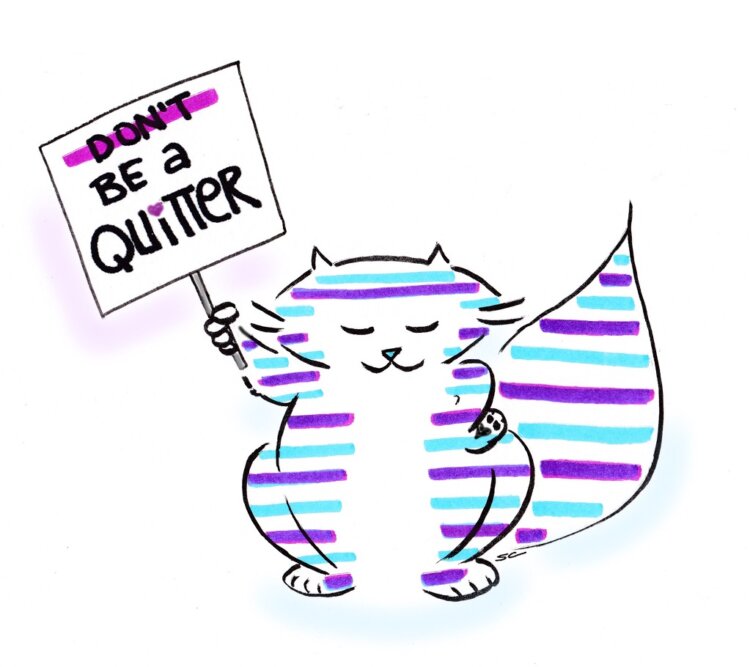
You’ve had at least one job where every day, right after you finished that first cup of coffee, you fantasized about walking into the boss’s office and saying just two words: I quit.
Or maybe you’ve been in a relationship with someone who committed a major deal-breaker, and you quit them—no discussion, no argument, just Gloria Gaynor’s “I Will Survive” in the background as you strutted away. It’s inspiring to see people strong enough to do what’s right for them without much wishy-washy waffling.
Yet life is full of conflicting messages about quitting. We’re told that quitters never win, that we won’t be good at something unless we put in 10,000 hours of practice, and that we should give people and jobs and dogs who pee on our rugs another chance. I know from personal experience that if I’d quit yoga after my first failures, I’d have missed out on something that has changed my life.
RELATED: Do you always have to look at the bright side?
The confusion ends, and enlightenment begins, when you learn what to quit and when.
There’s a book of wisdom in Yoga called The Yoga Sutras of Patanjali. (The word “suture,” as in, to stitch, comes from sutra, which means “thread.”) One of the most famous passages in this book of pithy advice is Sutra 1.14: “Practice becomes firmly grounded when well attended to for a long time, without break, and in all earnestness.” In other words, don’t give up.
What the sages of Yoga meant when they wrote that thousands of years ago was yeah, meditation is hard, and it’s not always easy to do the right thing, but if you keep going, you’ll get good results. So the idea of not quitting should be applied to things that may not be easy at first, but that are good for you in the long run. Meditating every day in some form. Exercising. Eating real food instead of man-made science experiments. Putting aside money every month. You get the idea.
But these wise men of Yoga weren’t masochists; There are also plenty of Yoga Sutras that encourage people to quit behaviors that harm themselves and others. Here are a few great things to quit:
Punishing yourself for the past. We’ve all made mistakes—chosen a career path we thought would be good but now drives us crazy, taken a wrong turn somewhere in life, or worse, hurt somebody. The best advice about this was given to me by my former editor and forever mentor Amy Gross, who said, “Fix it, or forget it.” If you’re stuck in the fallout from an old problem, take action. Apologize, mend fences if you can, make reparations. If you already have, or it’s not possible, move on. Quit wasting energy on the past that could be spent doing good in the present.
Harming your body. Smoking. Over-eating. Over-dieting. Over-exercising. Drinking too much. Taking drugs. Not getting enough sleep. Thinking negatively about yourself. Ignoring something that should be looked at by a doctor. QUIT IT. Your body is the amazing, beautiful temple of your soul. If you need to see a doctor or therapist to quit harming yourself, do it. Embrace the beauty that is your physical self, and become the caring, loving steward of your body.
Relationships that cause everybody pain. I’ve been in relationships that I swore I’d never give up on because I loved that person—when, if I really loved him, I would’ve stopped torturing him. I equated dogged stubbornness with love, which is great in the movies and crap in real life. Grown-up Truth: Sometimes things don’t work out. If you’re both more miserable than happy, go to couples counseling and see if you can work things out. If the other person won’t go, see a therapist on your own. If things aren’t working out, wish each other well and let go. Just quit torturing each other; that’s not love.
Hating on your job. I once came to the end of the rainbow with a job. The boss and I no longer agreed, I developed a defensive ‘tude, and things got even jollier from there. One day I was about to launch into a tirade to some of my coworkers about the unfairness of the situation when I realized that would pollute the office with negative energy. So I quit—but not before finding a new job. It’s scary to leave a job, but it’s even scarier to spend most of your waking hours in a funk.
That all makes sense in theory. But in reality, how do you know when to quit something? More Yoga tools to the rescue. Santosha is a state of contentment; a Samskara is a cycle of repeating, usually unhealthy, behavior. Set aside some quiet time, consider the situation you’re thinking about quitting, and ask yourself: Are you (mostly) content? Or has contentment become synonymous with behavior that is familiar from repetition, but not necessarily comfortable?
Sometimes, quitters do win. The most successful quitters take quiet, meditative time to assess a situation and see if it’s bringing benefit, without doing harm. If there is that possibility, see what you can do to improve the situation. If the time has come for you to sashay on out, know that you’re freeing yourself up for something new and better. In that sense, “I quit” becomes “I can.”
Suzan Colón is the author of Yoga Mind: Journey Beyond the Physical, 30 Days to Enhance Your Practice and Revolutionize Your Life From the Inside Out.


Grok Nation Comment Policy
We welcome thoughtful, grokky comments—keep your negativity and spam to yourself. Please read our Comment Policy before commenting.